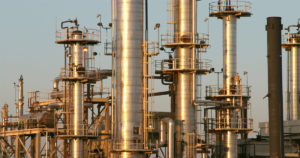
Oil refineries are inherently hazardous environments because of the work being done. In order to be refined and converted into products, such as gasoline, kerosene, and heating oil, petroleum must be boiled, and the chemicals separated. Petroleum is highly flammable, and strict safety measures must be observed in order to prevent fires and explosions.
Asbestos Components Throughout Refineries
Asbestos is fire-resistant and from the 1930s to the 1970s, it was used extensively throughout oil refineries to prevent high temperatures from igniting the petroleum. Asbestos was used to insulate pipes, boilers, tanks, ovens, reactors, dryers, furnaces, pumps, and other parts of facilities. Oil refineries are large plants with many of these high-heat components, all of which need to be insulated. While new insulation materials produced after the 1980s do not contain asbestos, most refineries were built before asbestos restrictions were in place and still have older thermal insulation that workers may come in contact with.
Asbestos is also a component in manufactured parts, such as spiral-wound and metal-jacketed gaskets, valves, sealants, sheets, and other machinery. Construction materials, such as drywall, ceiling and floor tiles, roofing, tapes, adhesives, and welding screens used throughout the plants, were also made with asbestos for many years. If any of these parts or materials are damaged, modified, or moved, asbestos fibers can become airborne and be inhaled or ingested, causing deadly respiratory conditions. With so many components throughout the facility that may contain asbestos, including in office areas, workers in all roles at the refinery face the risk of exposure.
Asbestos was even used in making heat-resistant protective gear for workers, including gloves, shields, and protective clothing. This equipment may have kept workers safe from burns, but they significantly increased the risk of asbestos-related diseases for those who wore them. Now, refineries must take special precautions to protect workers from asbestos, in addition to other refinery hazards, such as fires or explosions. Workers must be provided with respirators with HEPA filters if they will be working with or near asbestos, and these areas must be clearly labeled with proper warnings.
The U.S. Bureau of Labor Statistics estimates that there are almost 40,000 workers in 135 oil refineries throughout the United States. Among the numerous risks that they face, recent studies have shown that refinery workers are more than three times as likely to develop mesothelioma than the national average. Mesothelioma has a long latency period and may not appear until 10 to 50 years after initial asbestos exposure. Employees who worked in oil refineries decades ago, before regulations restricted asbestos use, may still develop mesothelioma.
Philadelphia Mesothelioma Lawyers at Shein Law Fight for the Rights of Refinery Workers Suffering from Asbestos Exposure
If you or a loved one has been diagnosed with mesothelioma or other asbestos-related disease, the Philadelphia mesothelioma lawyers at Shein Law can help. We will thoroughly review the facts of your case to determine who is at fault for your asbestos exposure. With offices conveniently located in Philadelphia and Pennsauken, New Jersey, we help victims throughout Pennsylvania and New Jersey. Call us today at 877-743-4652 or contact us online to discuss your case.
